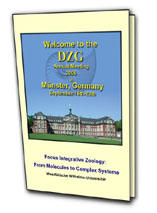|
Preliminary Program
Date:
16th - 20th September 2006
Locations: Auditorium Hindenburgplatz 10-12,
Lecture rooms of the department biology
Preliminary
time schedule: |
|
Download
Party Information

Download Program (updated version
08.08.2006; not printer fiendly!)
Download
Meeting Flyer

Download
Symopsium Flyer 'Women in Science'
(new version)

|
Saturday:
|
Advisory
board and board meeting, arrival, registration, public talk
in the evening (approx. until 5 p.m., Manfred Milinski,
Partnerwahl, Parfüm und Immungenetik, MPI Plön,
language: German), stand-up reception of the invited speakers
+ DZG board + advisory board + speakers of the study groups
+ organization team; welcome party for all participants |
| Sunday: |
Opening
(headmaster, dean, lord mayor), talks, general meeting of
the study groups, meeting with talks of the study groups,
in the evening award of the "Wissenschaftspreis der
DZG" |
| Monday:
|
Scientific
sessions, general meeting of the study groups, meeting with
talks of the study groups, in the evening poster session
with beer and sausages |
| Tuesday: |
Scientific
sessions, general meeting of the DZG, public talk in the
evening (approx.6 p.m., Hans Schöler, "Current
Aspects of stem cell research, MPI Münster, language:
German), in the evening get-together-party ("Mensa
Aasee") including poster award, Band, entertainment,
DJ, dance) |
| Wednesday: |
Excursions/Workshops
(optional), guided tour |
Program:
Joint meeting together with Dutch and Belgian colleagues
Topic of the meeting:
Focus Integrative Zoology: From Molecules to Complex Systems
Main focus (Plenary Lectures, Invited Speakers, Possible
Titles):
Stress Resistance:
Dietmar Kültz, “Molecular evolution of the stress
response”, University of California, Davis, USA
John C. Wingfield, "Reproduction and resistance to stress:
when and how?", University of Washington, USA
Evolution and Ecological Aspects of Protein Families in
Organisms:
Volker Loeschcke, "The heat shock response and adaptation
to environmental stress"; Univsersity of Aarhus, Denmark
Jean-Daniel Horisberger, “Structural, functional and
evolutionary aspects of NaK-ATPases”; University of
Lausanne, Switzerland
Proteins at work in their organismic environment:
Hannelore Daniel, "Systems Biology of Peptide Transporters",
TUM München, Germany
Otmar Schober, „Molecular imaging: From Mice to Human“,
Münster, Germany (invited) |
Symposia organized by the study groups (suggestions; March,
22, 2006):
|
| Behavioural
Biology: |
Long-term
fitness effects of early developmental conditions in zebra
finches.
Speaker: Marc Naguib, Bielefeld |
Evolutionary
Biology: |
Honesty
of bright birds: a role for testosterone?
Speaker: Anne Peters, Radolfzell
The evolutionary family interactions: conflicts and coadaptation
Speaker: Matthias Koelliker, Basel |
| Developmental
Biology: |
Segmentation in spiders and myriapodes
Speaker:
Wim Damen, Cologne
Stem cells in the platyhelminth Macrostomum sp.
Speaker: Peter Ladurner, Insbruck |
| Neurobiology: |
Comparative
neuronal circuit design
Speaker: Stefan Harzsch, Ulm
Visual midbrain function in vertebrates
Speaker: Harald Luksch, Aachen |
| Ecology: |
Chemically
mediated mechanisms of courtship and mating in parasitic wasps.
Speaker: Joachim Ruther, Beriln
The impact of climate change on the spring growth of plankton
Speaker: Ulrich Sommer, Kiel |
| Morphology: |
Corrosion
casting, micro-CT and 3-D-reconstruction – new insights
into the circulatory system of malacostracan crustaceans
Speaker: Christian Wirkner, Jena
Imaging applications of Synchrotron radiography in zoological
morphology
Speaker: Oliver Betz, Tübingen |
| Zoological
Systematics: |
Determing
data congruence between molecular data sets as well as to
morphological data using a bootstrap alteration approach
Speaker: Torsten Struck, Osnabrück
Circumpolar species in the Antarctic benthos in the light
of cryptic speciation: Fact or folklore?
Speaker: Christoph Held, Bremerhaven |
| Physiology:
|
Chitin
metabolism in insects
Speaker: Hans Merzendorfer, Osnabrück
Hypothalamic control of food intake
Speaker: Thomas Hübschle, Giessen |
| |
|
 |
|
|